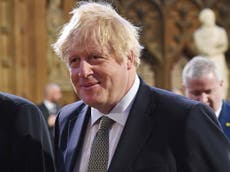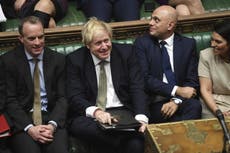Boris Johnson thinks he could lose next time – I wonder if the Labour Party agrees
The two things that won the election for the Conservatives will be gone within months – Jeremy Corbyn and Brexit

Isaac Levido is the kind of pessimist who succeeds in politics. He is the young Australian who ran the Conservative election campaign, and his response to victory was to warn the party that, with Jeremy Corbyn gone and Brexit done, Labour could bounce back quickly.
The Tories have “not won the domestic policy fight”, he told the cabinet, according to James Forsyth, political editor of The Spectator. The two things that won the election for Boris Johnson will be gone within months, was the message, and the party is not ready to deliver the changes that will keep its new voters next time.
The prime minister seems to understand this. He told ministers that people had to see improvement in their local A&E; that there needed to be a clear reduction in homelessness; and that “voters must know that they and their family have a better chance of owning a home”.
He presumably also knows that these are hard perceptions to fix in just four years. I say four years because, even if he repeals the Fixed-term Parliaments Act, he won’t want another winter election. So the summer of 2024 is the target date for the next election, and he needs to persuade people that he is starting to change things at least six months before then.
Which is why I am baffled, not for the first time, by the behaviour of Dominic Cummings. Johnson’s top adviser has been telling journalists that government departments are going to be reorganised, which will entail a big cabinet reshuffle in February.
Cummings has long been vicious about the shortcomings of the civil service – he has devoted many thousands of words to the subject on his blog – and some of his criticisms are justified. But changing brass plates and redrawing organograms is the one way to guarantee to make things worse: it will only divert energies and intelligence into turf wars and bureaucratic rent-seeking.
Let us hope it all fizzles. The political realities of trying to shrink the cabinet should act as a brake – for every namecard removed from the table, Johnson will make four enemies: the person removed and the three people who hoped to get the job. And I don’t think we’ll see any more ministers coming in through the House of Lords – or, in Nicky Morgan and Zac Goldsmith’s cases, staying on as ministers that way. It is the kind of thing a new government can get away with, but too many such cynical expedients will take the shine off Johnson’s triumph.
Not that there is much shine to tarnish in the first place. Johnson won the election with the huge advantage of low expectations. Most journalists have a low opinion of him, and expect him to fail. So, although turning round the NHS and the housing market might be really difficult, it wouldn’t take much of an improvement for the prime minister to earn some grudging respect.
One of the big surprises of the 10 days since the election has been Johnson’s sudden conversion to Blairism. While David Cameron and George Osborne were open in their admiration of “The Master”, as they called him, Johnson was not. Once upon a time, he went along with a silly Plaid Cymru publicity stunt trying to “impeach” Blair over the Iraq war (which Johnson supported), but now I am told he says in private that Blair was “absolutely” right about public service reform.
Hence the visit on the day after the election to Blair’s old constituency, Sedgefield, now represented by a Conservative MP, and the language of a “new dawn”, telling his party it has to change in order to focus on delivering for the people who lent the Tories their vote for the first time.
We will see about that. Johnson has some of the qualities he needs. As mayor of London he was good at appointing capable people who could deliver the outcomes he wanted. What he really needs is his own version of Sir Michael Barber, the head of the Prime Minister’s Delivery Unit for Blair, to bring focus and discipline to the task.
I think Johnson’s success or failure is more important than whatever the Labour Party does. For all the agonising about how far a new leader will depart from Corbynism, and whether they can overcome the party’s London-based liberal elitism, Levido is right.
Once Corbyn has gone, he has gone. Even Rebecca Long Bailey, who has dropped the hyphen in her name, although I don’t think that is relevant, is not a doctrinaire sectarian who thinks both Northern Ireland and Israel exist only because of something called imperialism.
And once Britain has left the EU, the cultural divide between liberal Remainers and socially conservative Leavers will instantly become easier to bridge for a leader who is not Corbyn.
Labour’s path to winning the next four years may be hard, but Boris Johnson’s task is even harder.






Join our commenting forum
Join thought-provoking conversations, follow other Independent readers and see their replies